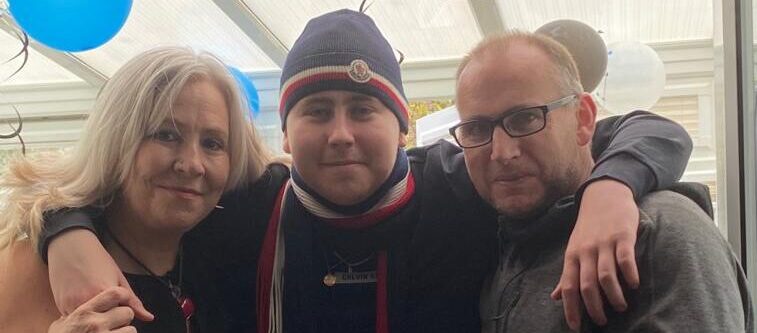
17 Jul 2025
Suzanne remembers her ‘larger than life’ son Luke
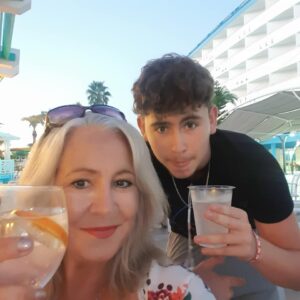
Luke with his mum Sue
 Luke Bailey was a popular, sporty 17-year-old who was studying for a BTEC in sports science and playing regular football when he started to get the extreme pains in his legs which would eventually lead to a diagnosis of a very rare type of leukaemia.
Luke Bailey was a popular, sporty 17-year-old who was studying for a BTEC in sports science and playing regular football when he started to get the extreme pains in his legs which would eventually lead to a diagnosis of a very rare type of leukaemia.
“Luke was larger than life, with a huge friendship group,” said his mum Suzanne, 53, who lives in Eastbourne. “He was a big joker but also a peacemaker, and was adored by everyone. He loved Arsenal football club and his girlfriend Bella. They’d been going out since they were 15 and were amazing together.
“I had noticed a decrease in his appetite and that he was tired, but at 17 you don’t always know what they’re eating when, and he was burning the candle at both ends. It was 2020 and the middle of covid when he started to get these severe pains in his legs. Luke spent weekends at his dad’s house and came back to me on Sunday night. But that weekend he messaged me and said he didn’t know if he could get back that evening as his legs had been so painful all weekend and he wasn’t sure if he could get downstairs. To be honest I thought he was making excuses, and I said if he was feeling poorly he needed to be home with me as his dad had a busy job.
“He managed to get back home but he was in so much pain and had a high temperature. We thought it was covid so I booked a test for the next day. But in the morning I woke hearing a bang and Luke screaming in pain. He had tried to get up out of bed to go to the toilet and his legs had collapsed.
“He was 6ft, weighed 13 stone and had fallen on the other side of the door. I couldn’t get in and at first he couldn’t move. Eventually he crawled his way through the door and into the toilet and then into my bed which was nearest to the bathroom, and I rang for an ambulance. But despite explaining how bad things were they said there would be a long wait. So I called his dad and we managed to get him down the stairs and drove him to the emergency surgery. The doctor took one look at him and told us to get to A&E at Eastbourne District General Hospital.”
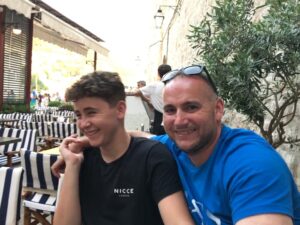
Luke with his dad
Luke was admitted to a ward but then immediately transferred to the Royal Marsden Hospital in London. He was diagnosed with rare mixed phenotype acute leukaemia (MPAL) 12th December 2020. Acute leukaemia usually starts in either myeloid cells or lymphoid cells, which are types of white blood cells. In rare cases, the cancer features of both types at the same time. MPAL is uncommon, making up only about 1 to 3% of acute leukaemias in adults.*
Because of his age, Luke was transferred to the paediatric ward and began his treatment within 48 hours.
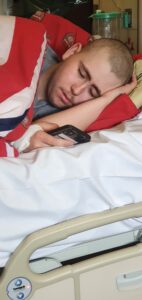
Luke during treatment
“Luke mentally sailed through the chemo itself but the side effects on his legs – painful cysts – were bad and needed intensive treatment. It was awful seeing his legs in such a state. He couldn’t stand or walk, and they had to drain the infections. He came home after the first round and he had no signs of residual disease markers in his blood. He burst into tears when the consultant rang us – we thought it was all over. In a way I wish now we hadn’t been told that as the final test results hadn’t arrived which showed he wasn’t in full remission.”
Luke was then told he’d need a stem cell transplant, and cells that 99% matched his own were found from a 27-year-old man in Germany. Doctors delayed his transplant so Luke could celebrate his 18th birthday at home on 9th May 2021 and then it went ahead on 3rd July.
One hundred days after his transplant in October Luke was told he was in full remission. His legs had recovered and despite remaining on a large amount of medication and having to protect his weakened immune system he was doing well. His brother Liam had had his first child, a daughter called Lyla, and Luke spent time with his new niece. Bella’s parents found him and his girlfriend a flat and the pair moved in together.
“But then in December he came down with flu and was admitted back to the Royal Marsden over Christmas. He was treated and discharged but he never got rid of the cough.”
Six months post-transplant Luke was diagnosed with aggressive chronic lung Graft vs Host Disease (GVHD).
GvHD can happen after a stem cell or bone marrow transplant from a donor as immune system is being rebuilt. Sometimes, the new immune cells from the donor see the body as ‘foreign’ and start attacking it. In chronic GvHD, the immune system may attack the lungs and cause inflammation or scarring. This can lead to a condition called bronchiolitis obliterans syndrome (BOS) – a rare but serious lung complication where the small airways become inflamed and narrowed.
“They did a lung function test in February 2022 and it was down to 53%. They started him on immunotherapy at the Royal Brompton in London, but by July it was down to 18% and he was on oxygen 24/7 and needed a mobility scooter. But he smiled and laughed all the way through – his friends said ‘you’d think he just had a cold’.

Luke with his girlfriend Bella
“Bella was amazing. She put work and college on hold to be with him. I was unable to work, nor was as Luke’s dad – we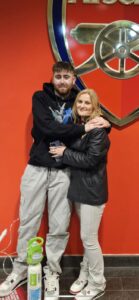 needed to keep Luke safe from infection. We all had to live an isolated covid lifestyle, but he would still catch infection after infection and his lungs would get weaker with each one. In July they started to have some difficult conversations with us about Do Not Resuscitate (DNR) protocols and contacting the hospice. They also told us about a drug to treat GvHD that hadn’t yet been approved by the NHS – Belumosudil. We raised £45k in four weeks to get him on it privately.
needed to keep Luke safe from infection. We all had to live an isolated covid lifestyle, but he would still catch infection after infection and his lungs would get weaker with each one. In July they started to have some difficult conversations with us about Do Not Resuscitate (DNR) protocols and contacting the hospice. They also told us about a drug to treat GvHD that hadn’t yet been approved by the NHS – Belumosudil. We raised £45k in four weeks to get him on it privately.
“It didn’t work but it gave him hope and all through this he point blank refused to talk about anything other than recovery. Nor did his wider family, which in a way put a huge burden on me as I felt we needed to face up to the worst possible outcome and felt like I was always the negative one. But the Royal Marsden had been very clear with me telling me that they didn’t think Luke would survive beyond Christmas and to focus on making memories. It was a very isolating and painful time for me as I felt like I was the only one listening to the Marsden about the gravity of Luke’s situation whilst also wanting to remain positive for him.”
Luke’s lungs eventually failed and he slipped into a coma. He died on 3rd August 2023, two years post-transplant, with his family around him. He was just 20 years old.
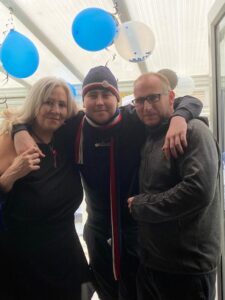
Luke with his mum and dad
“I will never be the same again, you don’t recover from something like this. All I can do is help someone else not go through the same thing. I’m on the Patient Forum for Anthony Nolan where we input into NICE trials into stem cell donation and treatments. And I’m on a parliamentary support group reviewing transparency in hospitals.
“He was so humble. When he first went to Royal Marsden they talked to him about grants that might be available for him and he said not to give them to him but to give them to children and families who really deserved them. They actually brought in a psychologist to see him as they felt he was so upbeat he wasn’t really dealing with it, but that was just Luke. He would wind the nurses up on the ward all the time, and they got their own back by changing his Arsenal bedding to Chelsea bedding while he was out of the room.
“I now suffer with clinical depression and PTSD due to losing him and the three years of treatment we all went through. But telling his story and talking about him helps. I don’t want to forget what happened, and this keeps him alive to me.”
*reference: George BS, Yohannan B, Gonzalez A, Rios A. Mixed-Phenotype Acute Leukemia: Clinical Diagnosis and Therapeutic Strategies. Biomedicines. 2022 Aug 15;10(8):1974. doi: 10.3390/biomedicines10081974. PMID: 36009521; PMCID: PMC9405901.
Share your story
We want to help people tell and share the leukaemia stories that matter – stories like Luke’s and stories like yours.
Related posts
11 March 2022
Inquiry highlights the impact of COVID-19 on blood cancer services
A new report has recently been published, following an inquiry by the All-Party Parliamentary Group (APPG) on Blood Cancer and the APPG on Stem Cell Transplantation and Advanced Cellular Therapies, on the impact of Covid-19 on blood cancer services in the UK.
30 January 2024
Leukaemia UK bolsters research and advocacy team, in support of ambitious strategy to accelerate progress in the diagnosis, treatment, and care of leukaemia
Leukaemia UK is pleased to announce Dr Simon Ridley as the new Director of Research and Advocacy and Dr Georgia Papacleovoulou as the organisation’s first ever Head of Policy and…
1 August 2022
Who’s Cooking Dinner? to return on Monday 19th September
Who’s Cooking Dinner reveal all star Chef Line Up Famed Charity event to return on Monday 19th September For the past 24 years, Leukaemia UK, the leukaemia research charity dedicated…
26 October 2021
Leukaemia UK announced as one of five charities for star-studded event Shall We Dance? with Dame Arlene Phillips and Anton Du Beke
Leukaemia UK is delighted to have been announced as one of five charities for whom the proceeds of a new star-studded dance event, Shall We Dance?, will go towards when it takes place next year.